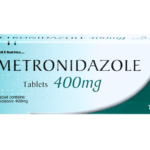Can I Eat Bananas While Taking Metronidazole?

Bananas are most commonly known for being a good source of potassium, but as per the U.S. Department of Agriculture’s MyPlate guidelines, their nutritional worth doesn’t end there. In fact, this fruit is packed with a plethora of vitamins and minerals that are essential to your health, making them one of the world’s most appealing superfoods.
According to U.S. Department of Agriculture (USDA) calculations, which are based on a 2,000-calorie diet, a medium-size banana contains only 105 calories. Although it seems obvious that these fruits are a relatively healthy snack, they get a bad reputation because of the large amount of carbohydrates they have: 27 grams (g) for a medium-sized banana.
Bananas are a great food to eat when you’re sick. They’re soft and bland but rich in nutrients and fast-acting carbs. The potassium in bananas can help replenish your electrolyte stores as well, since potassium is one of the key electrolytes your body needs.
What is Metronidazole?
Metronidazole is in a class of medications called nitroimidazole antimicrobials. It works by stopping the growth of bacteria. Metronidazole capsules and tablets are used to treat infections of the reproductive system, gastrointestinal (GI) tract, skin, heart, bone, joint, lung, blood, nervous system, and other areas of the body.
Metronidazole capsules and tablets are also used to treat sexually transmitted diseases (STDs). Metronidazole extended-release (long-acting) tablets are used to treat bacterial vaginosis (an infection caused by too much of certain types of harmful bacteria in the vagina) in women.
Metronidazole injection is used to treat certain skin, blood, bone, joint, gynecologic, and abdominal (stomach area) infections caused by bacteria. It is also used to treat endocarditis (infection of the heart lining and valves), meningitis (infection of the membranes that surround the brain and spinal cord), and certain respiratory infections, including pneumonia. Metronidazole injection is also to prevent infection when used before, during, and after colorectal surgery.
Can I eat bananas while taking metronidazole?
It is NOT recommended for you to take banana while taking metronidazole (Flagyl) because you may have unpleasant side effects such as headaches, stomach cramps, nausea, vomiting, and flushing (warmth, redness, or tingly feeling).
Take this medicine only as directed by your doctor. Do not take more of it, do not take it more often, and do not take it for a longer time than your doctor ordered.
The capsules can be taken with or without food. If the medicine upsets your stomach, it is best to take it with a meal or snack.
The extended–release tablet must be taken without food, 1 hour before or 2 hours after a meal.
Swallow the extended-release tablet whole. Do not break, crush, or chew it.
To help clear up your infection completely, keep using this medicine for the full time of treatment, even if you begin to feel better after a few days. If you stop using this medicine too soon, your infection may return.
This medicine works best when there is a constant amount in the blood. To help keep the amount constant, do not miss any doses. Also, it is best to take the doses at evenly spaced times during the day. If you need help planning the best times to take your medicine, check with your doctor.
What side effects can metronidazole cause?
Along with its needed effects, a medicine may cause some unwanted effects. Although not all of these side effects may occur, if they do occur they may need medical attention.
Check with your doctor immediately if any of the following side effects occur:
More common
- Agitation
- back pain
- blindness
- blurred vision
- burning, numbness, tingling, or painful sensations in the hands or feet
- changes in speech patterns
- confusion
- decreased vision
- depression
- dizziness
- drowsiness
- eye pain
- fever
- headache
- irritability
- lack of coordination
- nausea
- seeing or hearing things that are not there
- seizures
- shakiness and unsteady walk
- slurred speech
- stiff neck or back
- trouble speaking
- unsteadiness, trembling, or other problems with muscle control or coordination
- unusual tiredness or weakness
- vomiting
- weakness in the arms, hands, legs, or feet
Less common
- Black, tarry stools
- blood in the urine
- body aches or pain
- burning while urinating
- chills
- clumsiness or unsteadiness
- difficulty with breathing
- ear congestion
- fainting
- feeling of pelvic pressure
- frequent or painful urination
- irregular heartbeat
- loss of voice
- nasal congestion
- pinpoint red spots on the skin
- runny nose
- skin rash, hives, redness, itching
- sneezing
- stomach and back pain (severe)
- unusual bleeding or bruising
- vaginal irritation, discharge, or dryness not present before taking the medicine
Rare
- Bleeding gums
- bloating
- chest pain
- constipation
- cough
- dark urine
- fast heartbeat
- indigestion
- loss of appetite
- painful or difficult urination
- pains in the stomach, side, or abdomen, possibly radiating to the back
- sore throat
- sores, ulcers, or white spots on the lips or in the mouth
- swollen glands
- yellow eyes or skin
Incidence not known
- Blistering, peeling, or loosening of the skin
- bloody or cloudy urine
- burning while urinating
- continuing diarrhea
- continuing stomach pain
- diarrhea
- feeling of warmth
- increased volume of pale, dilute urine
- joint or muscle pain
- loss of bladder control
- red skin lesions, often with a purple center
- red, irritated eyes
- redness of the face, neck, arms, and occasionally, upper chest
- redness of the skin
Some side effects may occur that usually do not need medical attention. These side effects may go away during treatment as your body adjusts to the medicine. Also, your health care professional may be able to tell you about ways to prevent or reduce some of these side effects. Check with your health care professional if any of the following side effects continue or are bothersome or if you have any questions about them:
More common
- Dizziness or lightheadedness
- feeling of constant movement of self or surroundings
- heartburn
- sensation of spinning
- stomach cramps
- trouble sleeping
- weight loss
Rare
- Change in taste sensation
- congestion
- dry mouth
- pain or tenderness around the eyes and cheekbones
- tender, swollen glands in the neck
- trouble with swallowing
- unpleasant or sharp metallic taste
- voice changes
Incidence not known
- Decreased interest in sexual intercourse
- inability to have or keep an erection
- loss in sexual ability, desire, drive, or performance
- painful sexual intercourse
Other side effects not listed may also occur in some patients. If you notice any other effects, check with your healthcare professional.
Call your doctor for medical advice about side effects. You may report side effects to the FDA at 1-800-FDA-1088.





